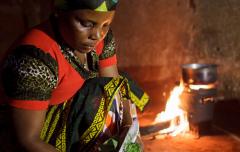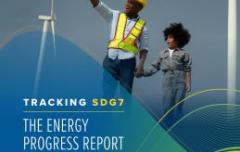Partner Spotlight: Clean Cooking Alliance
Efforts to support clean cooking worldwide are accelerating
In an interview with Kip Patrick, Senior Director, Partnerships and Communications, Clean Cooking Alliance, we discuss the organization’s work on SDG7 and its broader implications for the SDGs.
What is the mission of the Clean Cooking Alliance?
No one’s life should be adversely affected by how they cook. Yet globally, three billion people are exposed to pollution caused by open fires and inefficient stoves when they cook their food. This threatens their health, livelihood, and the environment. Women and girls, who often spend hours collecting fuels and cooking, are disproportionately impacted.
The Clean Cooking Alliance works with a global network of partners to build an industry that makes clean cooking accessible to families around the world. Established in 2010, the Alliance accelerates the development, sale, distribution and consistent use of clean cooking solutions to transform lives by improving health, protecting the environment, creating jobs, and helping consumers save time and money
You were previously known as the Global Alliance for Clean Cookstoves. Why did you decide to change your name to the Clean Cooking Alliance?
We changed our name to more accurately reflect our industry-building approach for cookstoves and fuels, and to highlight the evolution and growth of the clean cooking sector. The Clean Cooking Alliance will continue its mission to promote the use of cleaner, more efficient cookstoves and fuels in developing countries, while expanding global efforts to drive engagement and investment in the clean cooking sector. The Alliance is planning a year-long rollout of its expanded mission, which included hosting the first-ever Clean Cooking Investment Forum in Rwanda in November 2018. To increase global engagement around clean cooking, we also just released a new public service announcement on clean cooking from Academy Award-winning actor Julia Roberts at the First WHO Global Conference on Air Pollution.
Why is clean cooking a crucial part in accelerating SDG7 action?
Inefficient cooking causes widespread health, climate, economic and environmental damage. Women and girls are disproportionately affected. Access to clean cooking is critical to the achievement of the sustainable development agenda, including at least 10 of the SDGs, and clean cooking can help mitigate negative effects. For SDG7, this includes a specific indicator on achieving universal access to clean fuels and technologies for cooking, which is the goal of the Alliance.
What are the primary strategies that can be used to promote clean cooking?
To achieve universal access to clean cooking by 2030, the Alliance is focused on four core pillars to accelerate clean cooking access:
- Driving consumer demand for cleaner, more modern cookstoves and fuels by supporting behavior change and awareness-raising interventions;
- Building a pipeline of investible businesses capable of answering this demand with affordable, high-quality, and appropriate clean cooking products;
- Improving the policy environment by providing trusted and relevant data and advocating for regulations and policies that allow the clean cooking industry to thrive; and
- Increasing investment community participation and global engagement by providing market intelligence, delivering a clear path to action, and continuing to serve as the convener of the clean cooking sector.
The recent Energizing Finance report highlights the lack of development funding for clean cooking. How can we address this problem?
Universal access to clean cooking requires a competitive market that allows consumers to choose from a range of affordable, appropriate, user-friendly cooking solutions. Clean cooking businesses tracked by the Alliance attracted less than US$40 million in equity and debt investment in 2016, which falls far short of the billions needed. Businesses must be able to attract capital from a range of sources. At the same time, consumers must be aware of the benefits of these products - such as the money and time saved - and be motivated to purchase them. The Alliance is working with its global network of partners to support businesses, build customer demand, and facilitate enabling factors like a supportive policy environment.
How do you partner with SEforALL and what is the main focus of that relationship?
The Alliance is a longtime partner of SEforAll, working closely on a range of issues related to accelerating clean cooking access. One of the primary areas of partnership focuses on overcoming the huge financing gap the clean cooking sector faces. As outlined in this year’s Energizing Finance report, this sector needs significant funding to reach scale, which both our organizations are working to address. At the recent Clean Cooking Investment Forum in Rwanda that the Alliance co-hosted, the goal was to amplify efforts to identify, support and finance clean cooking businesses with the potential to massively expand this still nascent sector. The event informed and influenced public and private sector actors seeking to accelerate access to quality cooking solutions through viable business models at scale.




